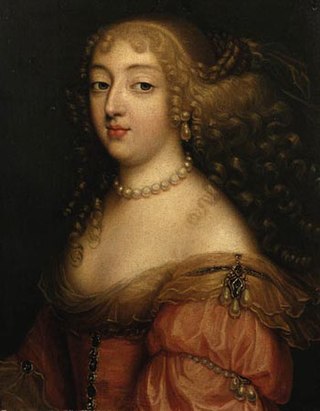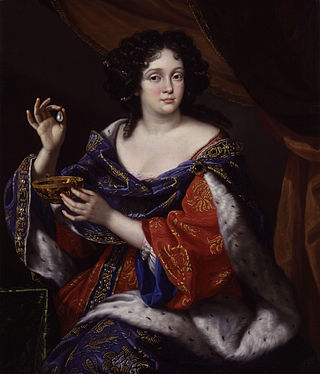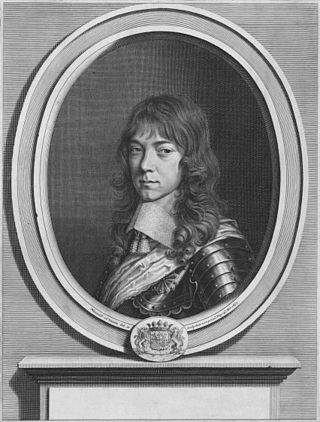
The House of Damas is one of France's oldest noble families, recorded since the 9th century and including lords of Vergy, counts of Vermandois and barons of Semur.

The House of Damas is one of France's oldest noble families, recorded since the 9th century and including lords of Vergy, counts of Vermandois and barons of Semur.
![]() Media related to House of Damas at Wikimedia Commons
Media related to House of Damas at Wikimedia Commons

The House of Bourbon is a dynasty that originated in the Kingdom of France as a branch of the Capetian dynasty, the royal House of France. Bourbon kings first ruled France and Navarre in the 16th century. A branch descended from the French Bourbons came to rule Spain in the 18th century and is the current Spanish royal family. Further branches, descended from the Spanish Bourbons, held thrones in Naples, Sicily, and Parma. Today, Spain and Luxembourg have monarchs of the House of Bourbon. The royal Bourbons originated in 1272, when Robert, the youngest son of King Louis IX of France, married the heiress of the lordship of Bourbon. The house continued for three centuries as a cadet branch, serving as nobles under the direct Capetian and Valois kings.

Louis Jules Mancini, 4th Duke of Nevers was a French diplomat and writer.

Laura Mancini, Duchess of Mercœur was a niece of Cardinal Mazarin. She was the eldest of the five famous Mancini sisters, who along with two of their female Martinozzi cousins, were known at the court of Louis XIV of France as the Mazarinettes. She married Louis de Bourbon, Duke of Vendôme, grandson of King Henry IV and was the mother of the great general the Duke of Vendôme.

Marie Anne Mancini, Duchess of Bouillon, was an Italian-French aristocrat and cultural patron, the youngest of the five famous Mancini sisters, who along with two of their female Martinozzi cousins, were known at the court of Louis XIV, King of France as the Mazarinettes, because their uncle was the king's chief minister, Cardinal Mazarin. She is known for her involvement in the famous Affair of the Poisons, and as the patron of La Fontaine.
Girolama or Geronima Mazarini was the sister of Cardinal Mazarin, the chief minister of France at the start of the reign of King Louis XIV of France. She was the mother of the five famous Mancini sisters, who with two of their female Martinozzi cousins, became famous at the French court as the Mazarinettes.
Bourbon-Vendôme refers to two branches of the House of Bourbon, the first of which became the senior legitimate line of the House of Bourbon in 1527, and succeeded to the throne of France in 1589 with Henry IV. He created the second house by granting the dukedom of Vendôme to one his legitimized sons.

Philippe Jules Mancini, 8th Duke of Nevers (1641–1707) was the nephew of Cardinal Mazarin, chief minister of France immediately after the death of King Louis XIII. He was the brother of the five famous Mancini sisters, who, along with two of their female Martinozzi cousins, were known at the court of King Louis XIV of France as the Mazarinettes.
Philippe Jules François Mancini, 3rd Duke of Nevers was a French aristocrat and member of the Mancini family.

Gabrielle de Rochechouart de Mortemart, Marchioness of Thianges was a French noblewoman. A great beauty and wit, she was the older sister of Françoise de Rochechouart de Mortemart, Madame de Montespan.

Ange Hyacinthe Maxence de Damas de Cormaillon, baron de Damas, was a French general and statesman who participated in the Napoleonic Wars on the Russian side before returning to France after Napoleon's exile. Upon his return to France, he continued his military career and entered into politics, eventually becoming the Minister of War and the Minister of Foreign Affairs under the Capetian kings.

François Louis de Lorraine was a member of the House of Lorraine. He was Count of Harcourt. He was also the Count of Rieux, Rochefort and Montlaur. He was also Marquis of Maubec as well as the Baron of Aubenas.

Anne Geneviève de Lévis was a French noblewoman. She was Princess of Turenne by her first marriage and Duchess of Rohan-Rohan, Princess of Soubise by her second marriage. Anne Geneviève was the only child of Madame de Ventadour, governess of the young Louis XV. She married twice and had children with her second husband. She died in Paris aged 54.

Hercule Mériadec de Rohan, styled Duke of Rohan-Rohan, was a member of the princely House of Rohan. He married twice and was the grandfather of the Maréchal de Soubise. His first wife was the daughter of Madame de Ventadour. He is known in contemporary texts as the prince de Rohan.
Charles de Rohan was a French nobleman. His primary title was Duke of Montbazon, and before acceding to that title he was known by his other title, prince de Guéméné. He was the son of Charles de Rohan and Jeanne Armande de Schomberg.

Jules de Polignac, 1st Duke of Polignac was a French nobleman and the husband of Yolande de Polastron, a confidante of Queen Marie Antoinette. He became the first Duke of Polignac in 1780. He died at the age of seventy one in Little Russia, where he was given a manor by Catherine the Great.

Camille de Lorraine was a French nobleman and Prince of Lorraine. He was known as the Prince of Marsan and, after the death of his father, was the Count of Marsan.

Godefroy Maurice de La Tour d'Auvergne, Duke of Bouillon was a French nobleman and member of the House of La Tour d'Auvergne, one of the most important families in France at the time. He married Marie Anne Mancini, niece of Cardinal Mazarin and had seven children.

Étienne-Charles, Duke of Damas-Crux was a French soldier and politician.
Events from the year 1785 in France.

Diane Gabrielle Damas was a French noblewoman and Aristocrat, she was born into the; House of Damas as the daughter of Claude Leonor Damas, Marquis of Thianges. Diane was also thought to have been a mistress of Louis XIV and a member of the Order of the Honey Bee.